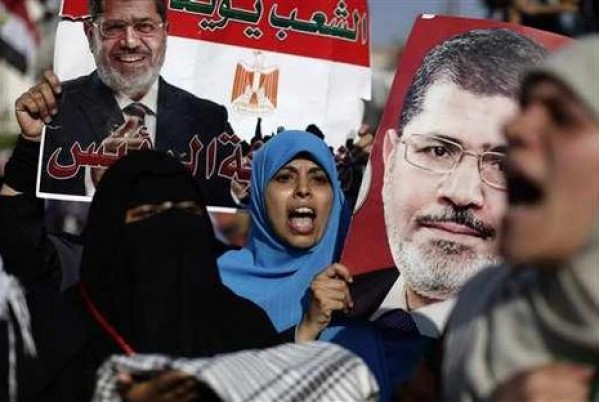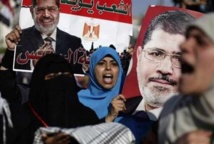It said almost 70 of the defendants belonged to Hamas or Hezbollah.
The trial date is symbolic as it is set to open on the third anniversary of the prison break during the uprising that toppled veteran strongman Hosni Mubarak.
It is the second trial for Morsi for which a date has been announced and is being held amid an intensifying crackdown on his Muslim Brotherhood movement.
Prosecutors charge that the Brotherhood, Hamas, Hezbollah and jihadist militants killed policemen and helped thousands of prisoners to escape as they attacked jails and police stations on January 28, 2011.
That day was dubbed a Friday of Rage in the protests against Mubarak and was a turning point in his downfall as it prompted the hated interior ministry forces to withdraw from the streets.
Several Hamas and Hezbollah prisoners escaped during the unrest.
Prosecutors charged that the Brotherhood "had long planned terrorist acts which peaked when it used the popular anger to attack police stations and storm prisons in order to help escape members of Hamas and Hezbollah."
Contacted by AFP in the Gaza Strip which Hamas controls, spokesman Sami Abu Zohri denied the movement played any role in "the events" that took place during the 2011 Egyptian uprising.
Egypt's "claims (were) not based on any evidence," he said.
Abu Zohri added that one of the Palestinian suspects named by Egypt, Hassan Salama, has been detained in Israeli jails since 1996, while some others were killed in the 2008 conflict with Israel in and around the enclave.
Also among the defendants are Brotherhood leaders who escaped from Wadi Natrun prison during the revolt, and prominent Qatar-based cleric Yusuf al-Qaradawi.
On Thursday, interior minister Mohamed Ibrahim accused Hamas officials of providing "logistical support" to Islamist fighters in Egypt for launching attacks in favour of the Brotherhood, "particularly during the presidency of Morsi."
He further charged that Hamas had provided training in Gaza in the use of heavy weapons.
"We are facing allegations that aim to mislead Egyptian public opinion in order to cover up the crisis" in Egypt, said Abu Zohri.
"We are in contact with security services in Egypt to put an end to this campaign."
Morsi is already on trial for allegedly inciting the killings of opposition activists during his one year in power.
And he is also to stand trial separately on espionage charges involving Hamas.
Egypt formally designated the Brotherhood last week as a "terrorist" group and accused it of a bombing north of Cairo that killed 15 people. The group denied the accusation.
The designation carries harsh penalties for offenders, including possible death sentences for the movement's convicted leaders and five-year jail terms for protesters.
Promoting the Brotherhood either in writing or verbally can also lead to prison sentences.
--------------------------------------------------------------------------------------
The trial date is symbolic as it is set to open on the third anniversary of the prison break during the uprising that toppled veteran strongman Hosni Mubarak.
It is the second trial for Morsi for which a date has been announced and is being held amid an intensifying crackdown on his Muslim Brotherhood movement.
Prosecutors charge that the Brotherhood, Hamas, Hezbollah and jihadist militants killed policemen and helped thousands of prisoners to escape as they attacked jails and police stations on January 28, 2011.
That day was dubbed a Friday of Rage in the protests against Mubarak and was a turning point in his downfall as it prompted the hated interior ministry forces to withdraw from the streets.
Several Hamas and Hezbollah prisoners escaped during the unrest.
Prosecutors charged that the Brotherhood "had long planned terrorist acts which peaked when it used the popular anger to attack police stations and storm prisons in order to help escape members of Hamas and Hezbollah."
Contacted by AFP in the Gaza Strip which Hamas controls, spokesman Sami Abu Zohri denied the movement played any role in "the events" that took place during the 2011 Egyptian uprising.
Egypt's "claims (were) not based on any evidence," he said.
Abu Zohri added that one of the Palestinian suspects named by Egypt, Hassan Salama, has been detained in Israeli jails since 1996, while some others were killed in the 2008 conflict with Israel in and around the enclave.
Also among the defendants are Brotherhood leaders who escaped from Wadi Natrun prison during the revolt, and prominent Qatar-based cleric Yusuf al-Qaradawi.
On Thursday, interior minister Mohamed Ibrahim accused Hamas officials of providing "logistical support" to Islamist fighters in Egypt for launching attacks in favour of the Brotherhood, "particularly during the presidency of Morsi."
He further charged that Hamas had provided training in Gaza in the use of heavy weapons.
"We are facing allegations that aim to mislead Egyptian public opinion in order to cover up the crisis" in Egypt, said Abu Zohri.
"We are in contact with security services in Egypt to put an end to this campaign."
Morsi is already on trial for allegedly inciting the killings of opposition activists during his one year in power.
And he is also to stand trial separately on espionage charges involving Hamas.
Egypt formally designated the Brotherhood last week as a "terrorist" group and accused it of a bombing north of Cairo that killed 15 people. The group denied the accusation.
The designation carries harsh penalties for offenders, including possible death sentences for the movement's convicted leaders and five-year jail terms for protesters.
Promoting the Brotherhood either in writing or verbally can also lead to prison sentences.
--------------------------------------------------------------------------------------









 Home
Home Politics
Politics











